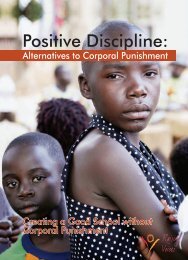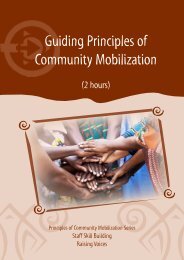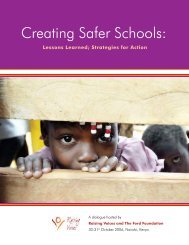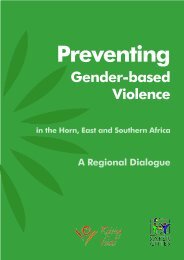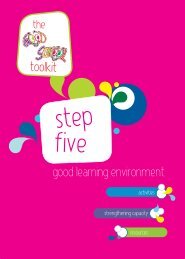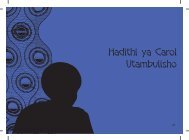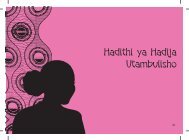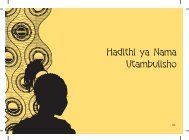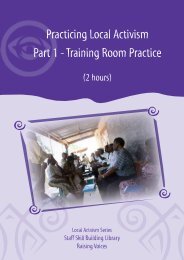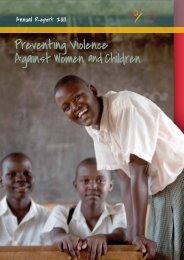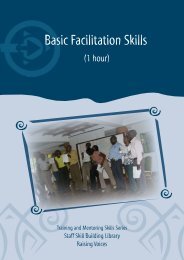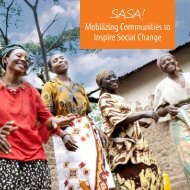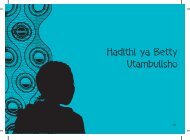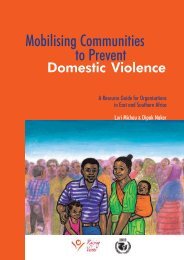Violence against children, the voices of Ugandan ... - Raising Voices
Violence against children, the voices of Ugandan ... - Raising Voices
Violence against children, the voices of Ugandan ... - Raising Voices
Create successful ePaper yourself
Turn your PDF publications into a flip-book with our unique Google optimized e-Paper software.
This was <strong>the</strong> first explicit discussion <strong>of</strong> abuse <strong>of</strong><strong>children</strong> as defined by <strong>the</strong> subjects <strong>of</strong> <strong>the</strong> studyra<strong>the</strong>r than <strong>the</strong> researchers. Three central issuesemerged from <strong>the</strong>se reports.defensive postures, many adults shared <strong>the</strong>iranxiety and confusion. Many felt conflicted aboutwhere <strong>the</strong>ir loyalties lie and what <strong>the</strong>ir duty oughtto be as moral adults.Firstly, despite a calculated silence, a large number<strong>of</strong> adults are aware that <strong>children</strong> are being abusedin <strong>the</strong>ir community yet are ei<strong>the</strong>r unwilling orunable to protect <strong>children</strong> from such abuse.Secondly, despite assertions to <strong>the</strong> contrary,a significant proportion <strong>of</strong> adults were unableto retain a reliable perspective on where <strong>the</strong>boundary lay between guiding (“punishing”) andabusing (“mistreatment”) <strong>of</strong> <strong>children</strong>. Many adultsrelated stories <strong>of</strong> <strong>children</strong> being grossly abused,such as being burned or caned heavily for minor<strong>of</strong>fences or being worked wellbeyond <strong>the</strong>ir capacity, yet adultskept insisting in formal conversationsthat <strong>the</strong>y always act in <strong>the</strong> best90interests <strong>of</strong> <strong>the</strong>ir <strong>children</strong>.80Yes, many <strong>children</strong> are being mistreated here.Some people treat <strong>the</strong>ir <strong>children</strong> worse thananimals. They make <strong>the</strong>m work long hours,and many stepfa<strong>the</strong>rs abuse <strong>the</strong>ir daughters.O<strong>the</strong>rs just shout and kick <strong>the</strong>ir <strong>children</strong> even if<strong>the</strong>y have done nothing wrong, simply becausehe [adult] is drunk or angry at something else.Sometimes it pains my heart but what can Ialone do? I don’t know what to tell <strong>the</strong>m [<strong>the</strong>parent]. I don’t know what to do.female, parent, NakapiripiritFigure 3.18 Adults’ perception <strong>of</strong> child mistreatment in <strong>the</strong>ircommunityThirdly, far from being engagedin a systematic method to guide<strong>children</strong>’s behaviour, some adultswere <strong>of</strong>ten merely releasing<strong>the</strong>ir frustration on <strong>the</strong> child andsubsequently justifying <strong>the</strong>ir actionas punishment.Clearly many adults are willing tomaintain a duplicitous stance toavoid accountability regarding how<strong>the</strong>y relate with <strong>children</strong>. However,in conversations that went beyond706050403020100BurningTying upLocking upExcessive beatingDisowningForced sexBeing touchedForcing to touch <strong>the</strong>mKissing on mouthSexual HarassmentExposing <strong>the</strong>mselvesAssign all household workLook after babiesHeavy loadsWork long hoursPhysical Sexual Economic84 Part Three Adults’ Rationale



